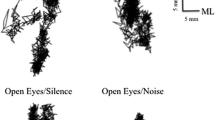Abstract
Background
The interstimulus interval of a cognitive task was found to have a limited effect on postural control in young adults, while visual cognitive tasks were found to improve stability compared to auditory tasks. It is of interest to investigate whether postural control in healthy older adults is sensitive to these types of cognitive task manipulations.
Aims
The objectives of the present experiment were to evaluate the impact of interstimulus interval and modality of a continuous cognitive task on postural control in healthy older adults.
Methods
Fifteen healthy older adults (70 ± 3.2 years, 3 male) were asked to stand with feet together on a force platform while performing auditory and visual cognitive tasks performed with interstimulus intervals of 2 and 5 s.
Results
Visual tasks led to reductions in sway area and sway variability in the anterior–posterior direction compared to auditory tasks (ps ≤ 0.05). The interstimulus interval did not lead to a change in sway, except for a small change in the medial–lateral direction for the 2-s interval compared to the 5-s interval (p = 0.05).
Discussion and conclusions
Results suggest that the interstimulus interval had a very limited effect on postural sway. The modality of the cognitive task had a greater effect on postural sway, as visual cognitive tasks yielded smaller sway area and anterior–posterior sway variability than auditory conditions. Visual stimuli may have acted as an anchor, yielding reduced sway.


Similar content being viewed by others
References
Andersson G, Hagman J, Talianzadeh R et al (2002) Effect of cognitive load on postural control. Brain Res Bull 58:135–139. https://doi.org/10.1016/S0361-9230(02)00770-0
Stins JF, Roerdink M, Beek PJ (2011) To freeze or not to freeze? Affective and cognitive perturbations have markedly different effects on postural control. Hum Mov Sci 30:190–202. https://doi.org/10.1016/j.humov.2010.05.013
Swan L, Otani H, Loubert PV et al (2004) Improving balance by performing a secondary cognitive task. Br J Psychol 95:31–40. https://doi.org/10.1348/000712604322779442
Polskaia N, Richer N, Dionne E et al (2015) Continuous cognitive task promotes greater postural stability than an internal or external focus of attention. Gait Posture 41:454–458. https://doi.org/10.1016/j.gaitpost.2014.11.009
Richer N, Polskaia N, Lajoie Y (2017) Continuous cognitive task promotes greater postural stability than an internal or external focus of attention in older adults. Exp Aging Res 43:21–33. https://doi.org/10.1080/0361073X.2017.1258214
Wulf G, McNevin N, Shea CH (2001) The automaticity of complex motor skill learning as a function of attentional focus. Q J Exp Psychol A 54:1143–1154. https://doi.org/10.1080/713756012
McNevin NH, Shea CH, Wulf G (2003) Increasing the distance of an external focus of attention enhances learning. Psychol Res 67:22–29. https://doi.org/10.1007/s00426-002-0093-6
Wulf G, Shea CH, Park JH (2001) Attention and motor performance: preferences for and advantages of an external focus. Res Q Exerc Sport 72:335–344. https://doi.org/10.1080/02701367.2001.10608970
Wulf G (2007) Attentional focus and motor learning: a review of 10 years of research. Beweg Train 1:1–11. https://doi.org/10.1080/1750984X.2012.723728
Vance J, Wulf G, Töllner T et al (2004) EMG activity as a function of the performer’s focus of attention. J Mot Behav 36:450–459. https://doi.org/10.3200/JMBR.36.4.450-459
Zachry T, Wulf G, Mercer J et al (2005) Increased movement accuracy and reduced EMG activity as the result of adopting an external focus of attention. Brain Res Bull 67:304–309. https://doi.org/10.1016/j.brainresbull.2005.06.035
Marchant DC, Greig M, Scott C (2009) Attentional focusing instructions influence force production and muscular activity during isokinetic elbow flexions. J Strength Cond Res 23:2358–2366. https://doi.org/10.1519/JSC.0b013e3181b8d1e5
Polskaia N, Lajoie Y (2016) Reducing postural sway by concurrently performing challenging cognitive tasks. Hum Mov Sci 46:177–183. https://doi.org/10.1016/j.humov.2015.12.013
Lajoie Y, Richer N, Jehu DA et al (2016) Continuous cognitive tasks improve postural control compared to discrete cognitive tasks to discrete cognitive tasks. J Mot Behav 48:264–269. https://doi.org/10.1080/00222895.2015.1089833
Lajoie Y, Jehu DA, Richer N et al (2017) Continuous and difficult discrete cognitive tasks promote improved stability in older adults. Gait Posture 55:43–48. https://doi.org/10.1016/j.gaitpost.2017.04.003
Polskaia N, Lajoie Y (2016) Interstimulus intervals and sensory modality modulate the impact of a cognitive task on postural control. J Mot Behav 48:482–488. https://doi.org/10.1080/00222895.2015.1134435
Jamet M, Deviterne D, Gauchard GC et al (2007) Age-related part taken by attentional cognitive processes in standing postural control in a dual-task context. Gait Posture 25:179–184. https://doi.org/10.1016/j.gaitpost.2006.03.006
Riley MA, Baker AA, Schmit JM et al (2005) Effects of visual and auditory short-term memory tasks on the spatiotemporal dynamics and variability of postural sway. J Mot Behav 37:311–324. https://doi.org/10.3200/JMBR.37.4.311-324
Woollacott M, Vander Velde TJ (2008) Non-visual spatial tasks reveal increased interactions with stance postural control. Brain Res 1208:95–102. https://doi.org/10.1016/j.brainres.2008.03.005
Redfern MS, Chambers AJ, Jennings JR et al (2017) Sensory and motoric influences on attention dynamics during standing balance recovery in young and older adults. Exp Brain Res 235:2523–2531. https://doi.org/10.1007/s00221-017-4985-5
Folstein M, Folstein S, McHugh P (1975) “Mini-mental state”: a practical method for grading the cognitive state of patients for the clinician. J Psychiatr Res 12:189–198. https://doi.org/10.1016/0022-3956(75)90026-6
Vander Velde T, Woollacott MH, Shumway-Cook A (2005) Selective utilization of spatial working memory resources during stance posture. Neuroreport 16:773–777. https://doi.org/10.1097/00001756-200505120-00023
Hunter MC, Hoffman MA (2001) Postural control: visual and cognitive manipulations. Gait Posture 13:41–48. https://doi.org/10.1016/S0966-6362(00)00089-8
Al-Yahya E, Dawes H, Smith L et al (2011) Cognitive motor interference while walking: a systematic review and meta-analysis. Neurosci Biobehav Rev 35:715–728. https://doi.org/10.1016/j.neubiorev.2010.08.008
Author information
Authors and Affiliations
Corresponding author
Ethics declarations
Conflict of interest
The researchers have no conflict of interest to declare.
Ethics approval
All procedures performed in the present study were in accordance with the ethical standards of the institutional research committee and with the 1964 Helsinki declaration and its later amendments or comparable ethical standards.
Informed consent
Informed consent was obtained from all individual participants included in the study.
Rights and permissions
About this article
Cite this article
Richer, N., Lajoie, Y. Cognitive task modality influences postural control during quiet standing in healthy older adults. Aging Clin Exp Res 31, 1265–1270 (2019). https://doi.org/10.1007/s40520-018-1068-9
Received:
Accepted:
Published:
Issue Date:
DOI: https://doi.org/10.1007/s40520-018-1068-9



